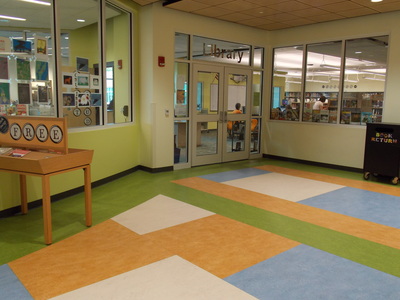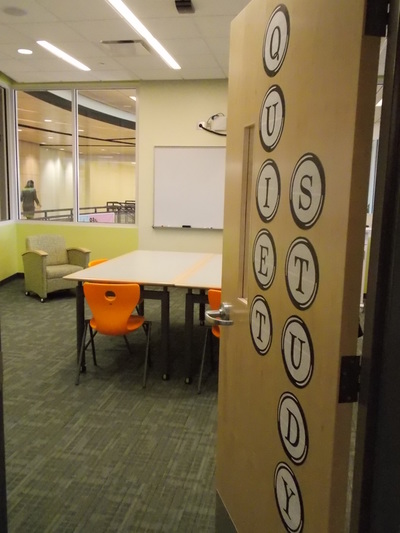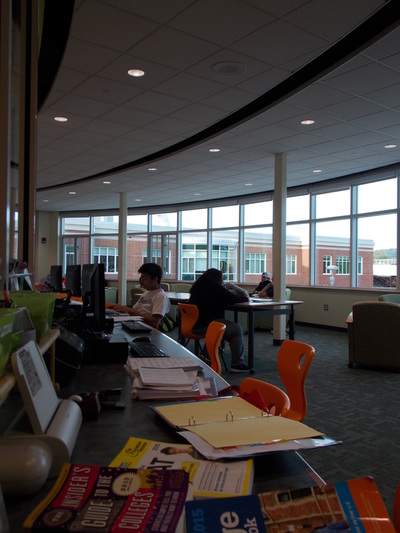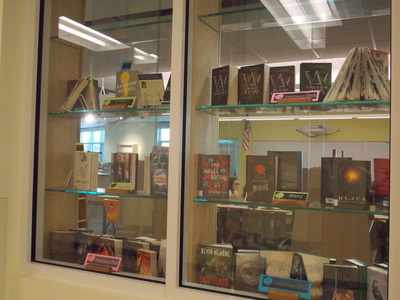|
Jessica Bombardier is the Library Media Specialist at Swampscott Middle School, in Swampscott, MA, and and a recipient of a 2021 Audrey Friend Scholarship Award.
It’s been all over the news lately – book challenges; book bans. If you work in a school and/or district without a collection development policy, you might feel overwhelmed about where to start. The purpose of this article is to give some ideas and a basic understanding of all of the elements included within a collection development policy. To start, it might be worth asking whether or not your school or district has a collection development policy and also whether or not the school committee supporting your work has a policy in place for book challenges.
0 Comments
Sheila Packard is the Library Teacher at Ward Elementary in Newton and a recipient of a 2019 MA Super Librarian Award. “The only constant in life is change.” This saying, attributed to Greek philosopher Heraclitus, might be repeated by many school librarians as they grapple with unasked-for changes in the size of their libraries, prompted by shifts in enrollment or budgets or other circumstances. Often they will hear that flexibility is the key to dealing successfully with this change, but is it really? Over the course of 13 years, one of the libraries I work in has gone from small to large to smaller again, and with each change, even downsizing, has become a better version of itself. While flexibility helped me cope, I became convinced that there was something more that influenced these results. Here’s the story.
Michael Caligiuri is the Library Teacher at Florence Sawyer School in Bolton I was chatting with a fellow school librarian who recently got a job in a neighboring school. She had noticed our library featured as the MSLA Spotlight for December and asked if she could visit in hopes of getting some ideas for making some changes of her own. She shared a story about a student teacher who, upon visiting her library, commented about how it hadn’t changed a bit since she was a student there. This caused my friend to consider a redesign, but redesigning a library space can be a daunting and expensive task. Of course all libraries are different, but knowing her library, I offered three simple and relatively inexpensive ways she can make some big changes.
There is perhaps nothing more exciting and stressful in a librarian’s career than designing a new library. In graduate school, I recall my professor saying that everyone should have this intense and wonderful experience…but only once. I feel fortunate to have had this opportunity fairly early in my time as the Greenfield High School librarian as I now get to reap the benefits of managing and teaching in a space I helped design for years to come. For those of you who have yet to embark on this adventure, here are my top ten recommendations from what I learned along the way.
1. Build a relationship with the architect and furniture designer. In the context of designing an entire school building, the library is a relatively small part of the project. You need to be prepared to demonstrate how the library is a center of literacy, technology, innovation, and collaboration. Keep statistics, take photos of the library in action, and educate the people who will actually design the new space. Once the key people are on board for the vision you have for the library, the possibility of having the space you want becomes tangible. Without them, though, all hope is lost. 2. Do your research. What are the latest trends for school library design? You must do your homework because the architect and furniture designer won’t do it for you. The library they likely expect to design is the one they had when they were in school. Those libraries were often lovely spaces with rows and rows of towering bookshelves offering quiet contemplation and a place to read and do schoolwork. Designing that space seems easy and pleasant since those libraries are often beautiful. However, if you want a 21st century learning commons style space that can adapt in the future as the needs of students change, you will need to provide the literature to support that vision. Read journals, put together a Pinterest board, and tear pages from library furniture catalogs. When you sit down at planning meetings, give them the look you want rather than letting them sell a vision to you. 3. Be your own advocate. Rarely do things magically happen. If you want something, you have to lobby for why it is important. If you want an area for a makerspace, be prepared to provide an explanation as to why this is an important development in school library best practice. If you want a class set of laptops or iPads, figure out how you will utilize and manage them to make them a worthwhile investment. A building project offers the opportunity to thrust your library program into the future, so don’t plan to just maintain the program you have now. 4. Ask. Don’t assume you won’t get what you need. Ask, be willing to negotiate, and be prepared to just accept “no” sometimes. When I asked for a sink in the library (we all know how helpful this would be), I received shocked looks of puzzlement and a flat “no” due to the increased cost to run plumbing through the library. Yet when I asked for additional lighting in the fiction section after construction, everyone agreed the section was too dark and additional lighting was added to a change order. This is your one chance to ask for what you really want/need, and there’s a good possibility in a large scale building project that your dream can become a reality. 5. Be persistent. Keep asking questions and provide lots of information and ideas. Don’t worry too much about being a nag because you are the only one thinking constantly about the library’s design. The more you remind the people in charge of your vision the more likely they will remember it. 6. Be available. If you want to be consulted about decisions or alerted when furniture arrives and shelving is installed, make sure you are easy to reach. Over the summer, give your cell phone number to the architect, furniture designer, and anyone else who might need to ask you questions. When decisions are made without you, often mistakes happen that you have to live with in the end. Let everyone know that you are willing and want to visit the building site or review furniture orders. A lot of times I would not have been consulted if I didn’t insist on being involved. Don’t assume you will be asked your opinion; instead offer it at every opportunity. 7. Follow up. When things don’t arrive in your library like you expected them (or at all), don’t just assume they got nixed from the budget. Ask where your equipment is, when your fiction shelving will be arriving, and why the lighting in your fiction section is inadequate (yes, all of these things happened to me). Again, be an advocate for what the library of the future needs. 8. Expect mistakes and document everything. A couple of weeks before the first day of school, I got an email from my principal telling me that the bookshelves had finally arrived (albeit a month later than expected). I eagerly rushed to the library to see the new space with the shelving and was horrified by what I discovered. Four large free-standing shelving units were one shelf lower than planned. This would reduce the shelf space for the collection by approximately two thousand volumes. I had already weeded the collection by half before the move, so reducing further would be exceptionally challenging and be a disservice to the students and teachers. Gulp. Thankfully I had all of the email communication to prove that we had indeed agreed upon taller shelves and the situation was eventually (months later) rectified. 9. DIY. Even with a new building there were things that were not included in or cut from the budget - for me that was signage (not included) and magazine shelving (cut). I found a great typewriter font for free online and printed letters on pages from old books to create uniform themed signage in the library. For the magazines, I needed to think outside the box. I took suspension curtain rods and put them up in the large, copious windows between the library and the hallway. I put magazines in facing both directions for an innovative and eye catching display. In the end, I like my signage and magazine display better than the generic options that would have been purchased as part of the building project. The unique designs that you create will give the library character. 10. Keep a list of what’s wrong in the new space. Before the builders and architect are gone, make sure that you have logged and reported every broken door lock, leak (yes, I’ve had leaks), and furniture malfunction (wood arms that come off?!). You typically have one year after inhabiting the space to get things fixed; after that it becomes your problem to fix or endure. My school is having an open house for the public to check out the beautiful new building on Saturday, October 24th from 9 a.m. -1 p.m. Please join me here if you’d like to tour the new library (and school), and to share ideas about library design. I’d love you to see our beautiful new space in person. Jessica Pollock is the librarian at Greenfield High School. |
Forum NewsletterCo-Editors
|







